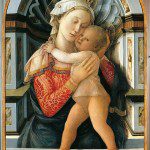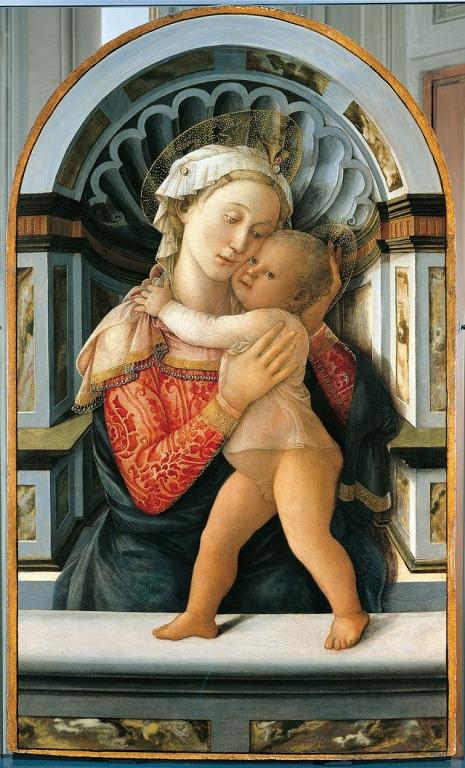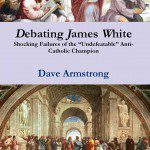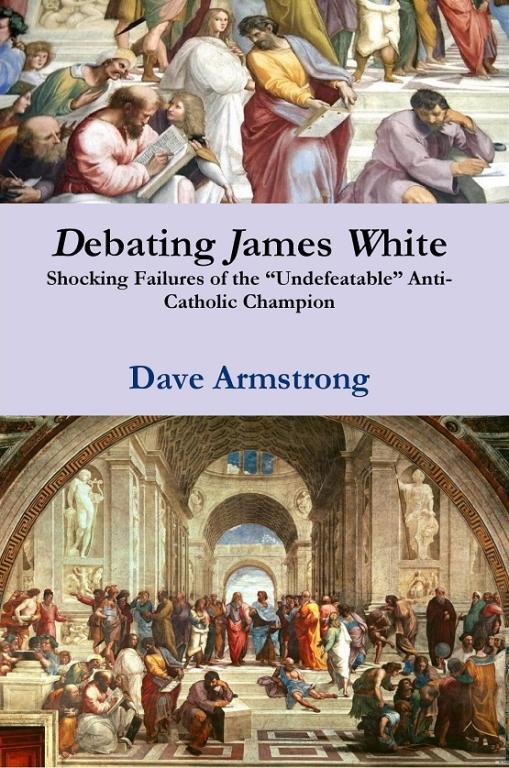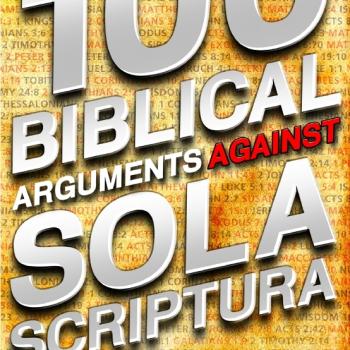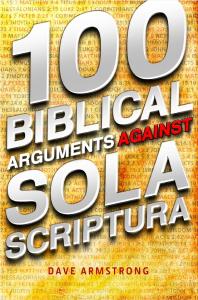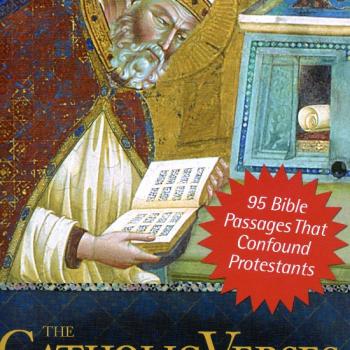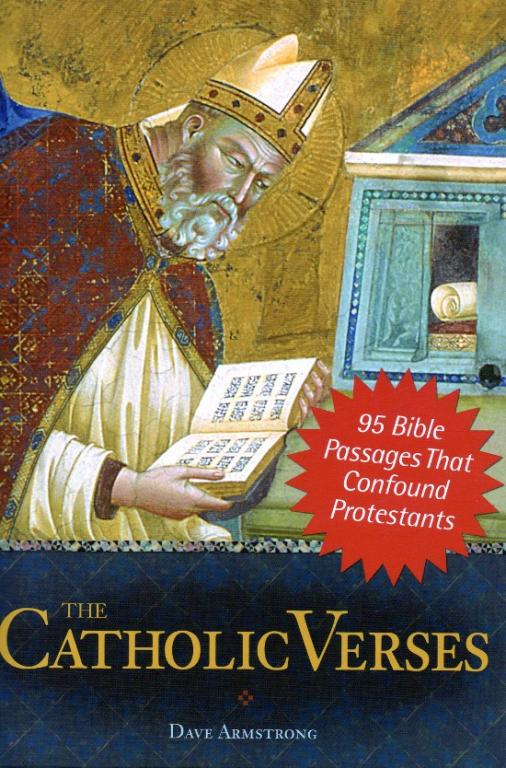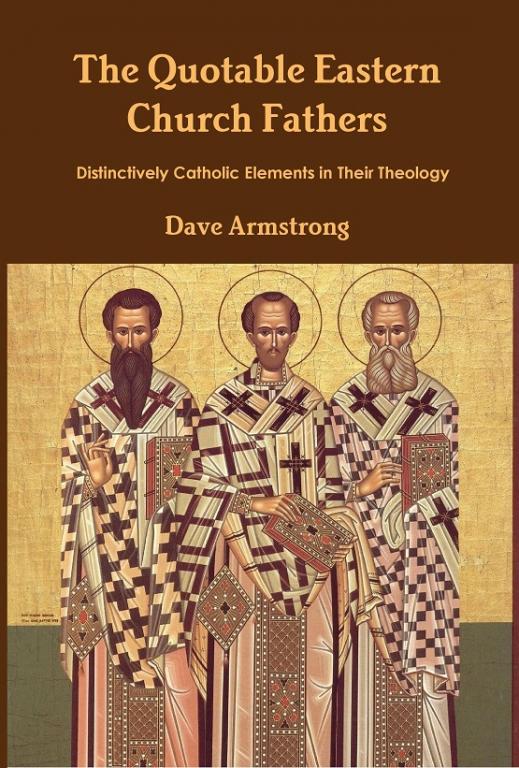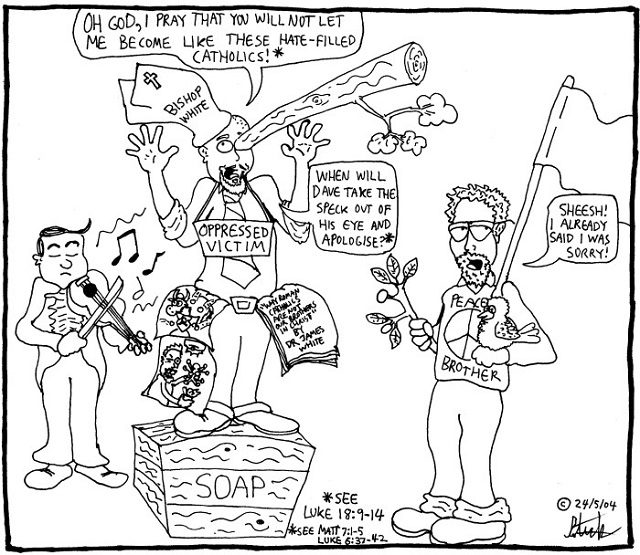Madonna and Child, by Filippo Lippi (1406-1469) [public domain / Wikimedia Commons]
* * * * *
The following live exchange (with an “audience”) occurred in the chat room of the website of Reformed Baptist anti-Catholic apologist James White, on 29 December 2000. White asked to dialogue with me. This was absolutely spontaneous and not pre-planned at all. I was unable to cut-and-paste excerpts from my website while I was in the room (nor did I wish to: I wanted informality and discussion as it would occur in someone’s living room, over tea and crumpets). Bishop White’s words will be in blue.
The dialogue is unedited, excepting chronological changes to make it clear what question a reply was responding to, comments about time limits and rules, and inadvertent factual error (e.g., White cited Ignatius when he meant Irenaeus). I will add some commentary and links separately from the actual chat at the bottom of this paper, footnoted and hyper-linked to the dialogue text, so that later elaboration will be easily distinguishable.
* * * * *
Mr. Armstrong, care to dialogue a bit?
“no, no more than it was for the Fathers who appealed to apostolic Tradition.”
Remember that statement Dave?
yes.Dave: The earliest reference in all patristic writing to something “passed down from the Apostles” that is not in Scripture is Irenaeus’ insistence that those who knew the Apostles confirmed that John 8 teaches that Jesus was more than 50 years of age at his death. Rome has rejected this idea.[Footnote 1] If “tradition” can be corrupted in its first instance, upon what basis do you affirm the idea that such doctrines as the Bodily Assumption, without witness for over 500 years, is truly apostolic? [Footnote 2]
who claims that this is the first instance of Tradition passed down? Now we are in areas that require research to answer, so I can hardly do that on the spot.
Well, if you can find an explicit statement that is earlier, I’d like to see it. To my knowledge, it is the earliest example.
I doubt that…..the principle is explicitly biblical in the first place. If indeed the notion [Tradition passed down] is in the Bible, then that is the earliest instance, not Irenaeus.
I’m sorry, I must have been unclear: I was referring to a statement by an early Church Father concerning an alleged extra-biblical tradition passed down from the Apostles. And I believe Irenaeus’ claim is the earliest….but that point aside….
Okay, that may be (I don’t know).
I assume, then, you are not familiar with this particular issue? Okay, then let us use another example. Basil said that it was an apostolic tradition to baptize three times, facing east, forward. Upon what basis do you reject his testimony, if you do?
Patristic consensus over what period of time? For example, the “patristic consensus” through the end of the fourth century was that Mary had committed acts of sin. That is no longer
the “view” taken by Rome.
the patristic period is generally considered to go up to John Damascene, no?
That all depends. :-)
no; some Fathers thought she sinned, but I don’t believe they were the majority, by any means.
Would it follow, then, that you believe the “patristic consensus” up through John Damascene supports such doctrines as the Immaculate Conception and the Bodily Assumption?
Can you name 5 or 10 who thought that?
Yes. Origen, Chrysostom, Cyril of Alexandria, Basil. Big names. :-) Even Anselm held Mary was born with original sin.
how about western fathers? Those are all eastern guys. :-)
Anselm isn’t. :-)
Anselm was not a father.
Let’s hope not. :-) He was under orders…. just kidding.
all you’re doing now is helping to support Roman primacy and orthodoxy. The east had a host of errors. They split from Rome five times, and were wrong in every case by [the criteria of] their own later “orthodox” beliefs. [Footnote 3]
Hmm, so you are switching now to a Western “consensus”?
no, but your citing of only eastern fathers hardly suggests that this is overall “patristic consensus,” does it?
I would dispute that, actually, but I’d like to stick to the issue I’ve raised here. Is it your belief that these two dogmas are apostolic in origin?
first name me western fathers who thought Mary sinned, since you brought this up.
Actually, Augustine’s influence regarding the universality of original sin had to be overcome for the Immaculate Conception to be contemplated and codified, sir. :-)
but that’s a separate issue. Did Augustine think Mary sinned?
No, not in her personal life. But he did believe she contracted original sin, correct?
There is the distinction between actual sin and original sin in Mary’s case.
Do you consider Tertullian a Western?
yes.
Would you include Hilary? J.N.D. Kelly lists them both in that category. I think that makes six, does it not?
I’m not sure, but you started by discussing acts of sin, now you are switching to original sin.
Actually, for both Tertullian and Hilary, it would be acts of sin.
okay, so you have two?
Yes, two. May I ask how many you have that positively testify of the later Roman belief in the same time-period?
one second….consulting some papers.
Be that as it may, does it not follow from these considerations that there is no positive consensus upon this issue? The only relevant answer to that would be to ask, “Who wrote on the specific question of Mary’s sinlessness? Not many.”
was this in Tertullian’s Montanist or semi-Montanist period? About how many fathers were there, in your estimation?
The Tertullian citation is De carne Chr. 7. [Footnote 4]
how many say she was without sin? That’s what you are asking? Actual sin?
I think you can see my point, can you not, Mr. Armstrong? If these concepts were, in fact, passed down through the episcopate, how could such widely differing church leaders be ignorant of these things?
the same way Luther was ignorant about baptismal regeneration, and Calvin of adult baptism. :-) Neither got it right, according to you.
Well, it would seem that if you wish to substantiate a dogma of the Immaculate Conception, the task would be rather easy to demonstrate a positive witness to the belief in the patristic period, would it not?
I think this can be done, but probably not to your satisfaction.
Does it follow, then, that you parallel individual Reformational leaders with the early Fathers, the very ones entrusted with “apostolic tradition”? Or was that rhetorical?
I was making a point about noted leaders and teachers differing. We would expect that in the Fathers to an extent, being human; nevertheless, there is still overall consensus.
Have you ever listened to my debate with Gerry Matatics on the subject of the Marian dogmas, Mr. Armstrong?
no. Did you win that one? :-)
It’s on the web…..Gerry said I did, actually. :-) As did Karl Keating. Does that count? :-)
I can name names as to who believed in sinlessness, but I don’t have it at my fingertips……
Be that as it may, during the course of the debate I repeatedly asked Gerry for a single early Father who believed as he believes, dogmatically, on Mary. I was specifically focused upon the two most recent dogmas, the Immaculate Conception and the Bodily Assumption.
of course, if you are looking for a full-blown doctrine of Immaculate Conception, you won’t find it. [Footnote 5]
How would you answer my challenge? Did any early Father believe as you believe on this topic?
the consensus, in terms of the kernels of the belief [i.e., its essence], are there overall. I would expect it to be the case that any individual would not completely understand later developments.
So many generations lived and died without holding to what is now dogmatically defined? [Footnote 6]
Did any father of the first three centuries accept all 27 books of the NT and no others? [Footnote 7]
Three centuries…..you would not include Athanasius?
I think his correct list was in the 4th century, but at any rate, my point is established. How many fathers of the same period denied baptismal regeneration or infant baptism?
The issue there would be how many addressed the issue (many did not). But are you paralleling these things with what you just admitted were but “kernels”? [Footnote 8]
if even Scripture was unclear that early on, that makes mincemeat of your critique that a lack of explicit Marian dogma somehow disproves Catholic Mariology.
I’ll address that allegation in a moment. :-)[Footnote 9] By the way, would you like that specific Irenaeus reference to look up? Just in passing?
I can look it up…I have enough resources. The question of this dialogue is whether we are gonna address topics which require heavy research….. That is more appropriate for a paper. If I were answering all your questions in a paper I would have spent a good three hours already. [Footnote 10]A guy like Joe Gallegos could instantly address questions about particular Fathers’ beliefs……. but I’ll still give you names who taught Mary’s sinlessness, if you like.
I was thinking of the others looking on. :-) It is chapter 22, section 5, of Irenaeus’ work, Against Heresies, Book 2, I believe….
so where do we go from here?
Anyway….You seem to think that if there is disagreement on any issue, this means the Scripture is unclear, correct?
no; rather massive disagreement on many issues seems to me to fly in the face of this alleged perspicuity. I think Scripture is clear, by and large, actually, but human fallibility will lead to “hermeneutic relativism,” thus requiring authoritative interpreters.
What do you do with Peter’s words? 2 Pet 3:15-16:
and regard the patience of our Lord as salvation; just as also our beloved brother Paul, according to the wisdom given him, wrote to you, as also in all his letters, speaking in them of these things, in which are some things hard to understand, which the untaught and unstable distort, as they do also the rest of the Scriptures, to their own destruction. (NAS)
a good description of many Protestants! How does this bolster perspicuity?
If the untaught and unstable distort the Scriptures, then what can the taught and stable do, of necessity?
it doesn’t follow logically that if the unstable distort the Scripture, that the stable will always get it right, does it?
()()() James is Away. Lord willing, he will return. :) ()()()
Footnotes
Let this Scripture be far from us where he says . . . .
Then he proceeds to cite a passage which is not in present-day Scripture (it is also cited in 2 Clement 11:2-4 – not considered to have been written by St. Clement, but perhaps the oldest Christian sermon extant: c.100 A.D. -, where it is described as “the prophetic word”). The famous Protestant scholar J.B. Lightfoot speculated that it was from the lost book of Eldad and Modat mentioned by Hermas (Vis. 2.3.4). Now how is it that a prominent Church Father in the first century can be so ignorant as to the contents of “Scripture,” when Bishop White and Protestants must believe Scripture to be apostolic in order for it to be inspired and the rule of faith, over against both Tradition and Church?
How do you know you are in company with, say, Athanasius or Ignatius or Irenaeus? In the final analysis, is it not because Rome tells you so?
Denominationalism
“It is, therefore, advantageous for you to be in perfect unity, in order that you may always have a share in God.” (Eph., 4,2)
“Let there be nothing among you which is capable of dividing you . . .” (Mag., 6,2)
“Flee from divisions, as the beginnings of evils.” (Sm., 8,1)
“Focus on unity, for there is nothing better.” (Pol., 1,2)
“If anyone follows a schismatic, he will not inherit the kingdom of God.” (Ph., 3,3)
[Bishop White can’t even agree with Protestant Founder Martin Luther, concerning baptismal regeneration and the Real Presence in the Eucharist and the Immaculate Conception of Mary, or with John Calvin concerning the legitimately Christian and covenantal status of baptized Catholics, let alone attaining “perfect unity” and abolishing sinful denominational divisions. Quite unbiblical, or “extra-biblical”. . . ]
Bishops
“You must all follow the bishop, as Jesus Christ followed the Father . . .” (Sm., 8,1)
“Let everyone respect the deacons as Jesus Christ, just as they should respect the bishop, who is a model of the Father, and the presbyters as God’s council and as the band of the apostles. Without these no group can be called a church.” (Tr., 3,1)
“It is good to acknowledge God and the bishop. The one who honors the bishop has been honored by God; the one who does anything without the bishop’s knowledge serves the devil.” (Sm., 9,1)
“It is obvious, therefore, that we must regard the bishop as the Lord himself.” (Eph., 6,1)
Real Presence
“I want the bread of God, which is the flesh of Christ.” (Rom., 7,3)
“They abstain from the Eucharist and prayer, because they refuse to acknowledge that the Eucharist is the flesh of our Savior Jesus Christ.” (Sm., 6,2)
[Bishop White denies the Real Presence of Jesus in the Eucharist. How could St. Ignatius become so “extra-biblical” in such a short space of time from the Apostles?]
Vicarious Atonement (A Species of Penance)
“I am a humble sacrifice for you.” (Eph., 8,1)”May my spirit be a ransom on your behalf.” (Sm., 10,2)
“May I be a ransom on your behalf in every respect.” (Pol., 2,3)
“Dialogue on Whether the Assumption and Immaculate Conception of Mary are Legitimately Part of Apostolic Tradition”
3. Eastern Heresy / Roman Orthodoxy See my paper: “A Response to Orthodox Critiques of Catholic Apostolicity.”
Hilary always considered it normal for Mary to have had some small imperfections . . . Our author does not mention any specific defect or imperfection in Mary’s conduct but seems to hold that some such flaw exists, if even Mary must face the judgment of God. However, this is an isolated observation [Tractatus super Psalmum 118,12; PL 9,523], to which Hilary does not return.
So Bishop White offers one western father (who held a quite “mild” opinion on the subject – not exactly a spectacular, bold dissent), and another in his heretical period, plus four eastern fathers (which I was already generally aware of – one always finds exceptions to the rule). This is what he considers a “patristic consensus.” I consider it a pathetic argument. Ludwig Ott states that the western patristic consensus was “unanimous.” Thus, Bishop White is trapped by the facts of history, not any rhetorical brilliance on my part.
As for Church Fathers who refer to the Blessed Virgin Mary as the New Eve (Eve was originally sinless or immaculate), Second Eve, sinless, spotless, pure, without stain, immaculate, the Ark of the Covenant, or (negatively) who never attributed any actual sin to her, we find the following:
In my book, A Biblical Defense of Catholicism, I wrote:
Doctrines agreed upon by all develop, too. The doctrine of the Godhood, or Divinity of Jesus Christ was not formally defined until the Council of Nicaea in 325, and the Divinity of the Holy Spirit was proclaimed at the Council of Constantinople in 381. The dogma of the Two Natures of Christ (God and Man) was made official at the Council of Chalcedon in 451. We’ve already seen how the Canon of the New Testament was also very much a “developing doctrine” itself, finalized only in 397. Original Sin was a slowly developed belief. Many other examples could be brought forth.
And I cited the great Protestant apologist C. S. Lewis:
Change is not progress unless the core remains unchanged. A small oak grows into a big oak; if it became a beech, that would not be growth, but mere change . . . There is a great difference between counting apples and arriving at the mathematical formulae of modern physics. But the multiplication table is used in both and does not grow out of date. In other words, whenever there is real progress in knowledge, there is some knowledge that is not superseded. Indeed, the very possibility of progress demands that there should be an unchanging element . . . I claim that the positive historical statements made by Christianity have the power, elsewhere found chiefly in formal principles, of receiving, without intrinsic change, the increasing complexity of meaning which increasing knowledge puts into them . . . Like mathematics, religion can grow from within, or decay . . . But, like mathematics, it remains simply itself, capable of being applied to any new theory.
[From:, God in the Dock, ed. Walter Hooper, Grand Rapids, Michigan: Eerdmans, 1970, pp.44-47. Originally from “Dogma and the Universe,” The Guardian, March 19, 1943, p. 96 / March 26, 1943, pp. 104, 107]
Furthermore, the “kernels” or essential elements of all the Catholic Marian beliefs can be found in Holy Scripture, to a much greater extent than most Protestants would ever imagine, and often fairly explicitly. If this is indeed the case, then these beliefs are all quite apostolic and early: all deriving from the first century A.D. or earlier.
And to see how “Catholic” a Protestant can get, with regard to Mariological views, see my paper: “Martin Luther’s Devotion to Mary.”


